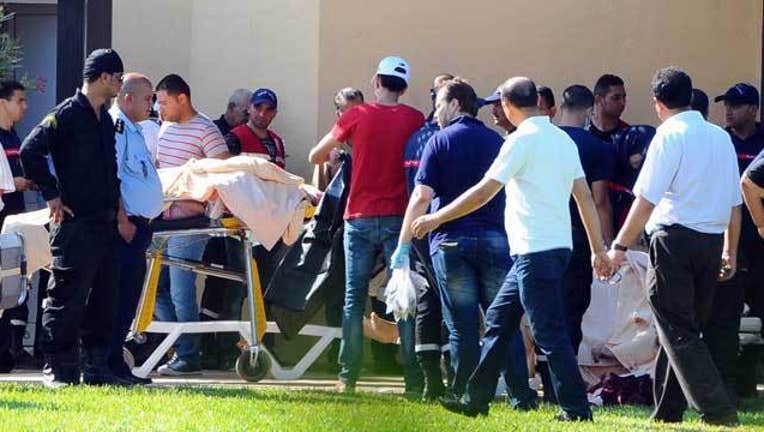Gunman rampages through Tunisian seaside resort killing 37

SOUSSE, Tunisia (AP) — A young man unfurled an umbrella and pulled out a Kalashnikov, opening fire on European sunbathers and killing at least 37 at a Tunisian beach resort — one of three deadly attacks Friday from Europe to the Middle East that followed a call to violence by Islamic State extremists.
The killings in the Tunisian resort of Sousse happened at about the same time as a bombing at a Shiite mosque in Kuwait and an attack on a U.S.-owned factory in France that included a beheading. It was unclear if the violence was linked but it came days after the IS militants urged their followers "to make Ramadan a month of calamities for the nonbelievers." In all, at least 63 people were killed.
The attack in Tunisia, the country's worst ever, comes just months after the March 18 assault on the national museum in Tunis that killed 22 people, again mostly tourists, and has called into question the newly elected government's ability to protect the country.
Rafik Chelli, the secretary of state of the Interior Ministry, told The Associated Press that the attack was carried out by a young student not previously known to authorities. The rampage at the RIU Imperial Marhaba hotel ended when he was shot to death by police.
"He was certainly involved with certain extremists," Chelli said.
The Islamic State group claimed responsibility for the suicide bombing at the Shiite mosque in Kuwait City that killed at least 25 people, while a man with ties to Islamic radicals rammed a car into a gas factory in southeastern France, where a severed head was found on a post at the entrance.
In an audio recording released Tuesday, the Islamic State called on its supporters to increase attacks during Ramadan and "be keen on waging invasion in this eminent month and commit martyrdom."
The carnage in Tunisia began on the beach, where tourists described hearing what sounded like fireworks and then running for their lives when they realized it was gunfire. Video of the aftermath showed medics using beach chairs as stretchers to carry away people in swimsuits.
"He had a parasol in his hand. He went down to put it in the sand and then he took out his Kalashnikov and began shooting wildly," Chelli said.
The gunman then entered the pool area of the Imperial Marhaba hotel before moving into the building, killing people as he went.
The Health Ministry said the 37 dead included Tunisians, British, Germans and Belgians, without giving a breakdown.
British tourist Gary Pine told AP he was on the beach with his wife around noon when heard the shooting. They shouted for their son to get out of the water, grabbed their bag and ran for the hotel. Their son told them he saw someone shot on the beach.
There was "sheer panic" at the hotel, Pine said. "There were a lot of concerned people, a few people in tears with panic and a few people — older guests — they'd turned their ankles or there was a few little minor injuries and nicks and scrapes."
Elizabeth O'Brien, an Irish tourist who was with her two sons, told Irish Radio she was on the beach when the shooting began.
"I thought, 'Oh my God. It sounds like gunfire,' so I just ran to the sea to my children and grabbed our things" before fleeing to their hotel room, she said.
Since overthrowing its secular dictator in 2011, Tunisia has been plagued by terror attacks, although only recently have they targeted the tourism sector, which makes up nearly 15 percent of GDP. Tourism is especially important in coastal resorts like Sousse.
"Tunisia's economy is heavily dependent on tourism and that revenue is now about to all but disappear, leaving Tunisia in dire straits at a critical junction in its political transition," North Africa analyst Geoff Porter said.
In the aftermath of the attack, many tourists said they wanted to leave the country immediately.
International police agency Interpol offered investigative help in the wake of Friday's violence. Interpol Secretary-General Juergen Stock said the attacks "show the truly global dimension to current terrorist threats."
___
Schemm reported from Rabat, Morocco. Associated Press Writers Bouazza Ben Bouazza in Tunis and Jill Lawless in London, and Angela Charlton in Paris contributed to this report.
___
This story has been corrected to reflect that authorities now say there was only one gunman, not two, and that the message from the Islamic State was an audio recording, not a video.

